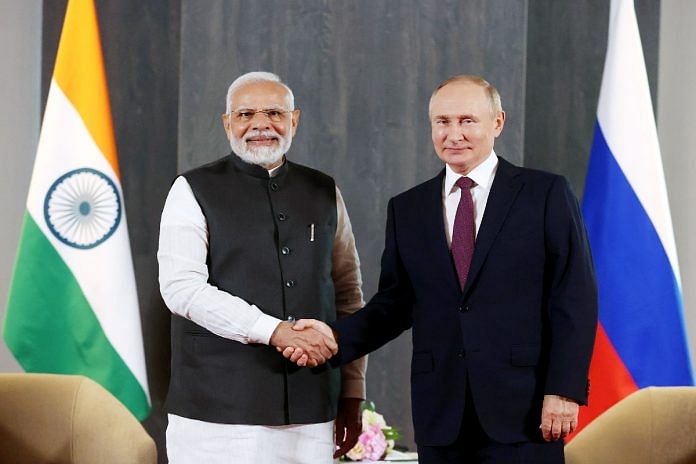New Delhi: Russia reaffirmed its “privileged strategic partnership” with India in its new foreign policy unveiled Friday, stating that it will place “special emphasis on increasing bilateral trade, strengthening investment and technological ties”.
The 42-page document highlighted Moscow’s view of the global order, including its growing enmity with the West. It called the United States “the main inspirer, organiser and executor of the aggressive anti-Russian policy” and blamed the country and its “satellites” for starting a “hybrid war” to weaken Russia.
“It is aimed at weakening Russia in every possible way, including at undermining its constructive civilisational role, power, economic and technological capabilities, limiting its sovereignty in foreign and domestic policy, violating its territorial integrity”, the document read.
Approved by President Vladimir Putin, the new foreign policy also underlined the country’s approach towards any restrictive actions against it by the West, such as economic sanctions among others, that might “threaten its sovereignty”.
However, it also stated that Moscow seeks “peaceful coexistence” and a “balance of interests” with Washington. Russia aims to prioritise the use of negotiation and other peaceful diplomatic methods to settle international conflicts “on the basis of mutual respect, compromises and a balance of legitimate interests”.
Hinting at the possibility of use of nuclear arms, the document read: “The Russian Federation considers it lawful to take the symmetrical and asymmetrical measures necessary to suppress such unfriendly acts and also to prevent them from recurring in future.”
Furthermore, it added that the Russian Federation “intends to give priority to the elimination of vestiges of the dominance of the United States and other unfriendly countries in world politics”.
The term “unfriendly countries” likely refers to countries that have condemned the Russian invasion of Ukraine and enforced sanctions over its war with Ukraine.
Also Read: What Russia-Ukraine war teaches us — 5 big tactical takeaways for India
India, China ‘friendly sovereign global centres of power’
The foreign policy dedicates a special section to its partnership with both India and China, outside of its relationship with the rest of the Asia-Pacific region.
Calling both India and China “friendly sovereign global centres of power” whose policies “coincide in principle with the Russian approaches to a future world order”, Moscow stressed on the significance of these countries in its foreign policy objectives.
Apart from enhancing cooperation across spheres of mutual interest between India and Russia, the new foreign policy also noted that the country will ensure India’s “resistance to destructive actions of unfriendly states and their alliances”.
Coming out a little over a week after Chinese President Xi Jinping’s visit to the Russian Federation last month, the document also reaffirmed ties between the two countries.
“Russia aims at further strengthening the comprehensive partnership and strategic cooperation with the People’s Republic of China and focuses on the development of a mutually beneficial cooperation in all areas, provision of mutual assistance, and enhancement of coordination in the international arena to ensure security, stability and sustainable development at the global and regional levels, both in Eurasia and in other parts of the world”, said the policy.
On Eurasia and Afghanistan
Moscow also wants to “transform” Eurasia into a “continental common space of peace, stability, mutual trust, development and prosperity”.
It aims to achieve this goal through several means including strengthening the Shanghai Cooperation Organisation (SCO) to ensure security in the region, and further develop intergovernmental organisations such as EAEU, SCO, ASEAN to broaden Eurasian partnerships to establish a network of partner organisations, calling it the “Greater Eurasian Partnership”.
Moreover, Russia also aims to strengthen interconnectivity in Eurasia through the modernisation of the Baikal-Amur Mainline and Trans-Siberian railway, launch of the International North–South Transport Corridor and more.
It also aims to help establish Taliban-ruled Afghanistan as “a sovereign, peaceful and neutral State with a stable economy and political system”.
(Edited by Gitanjali Das)
Also Read: Want India and China to be friends, says Russia’s Lavrov, offers to help calm tensions



